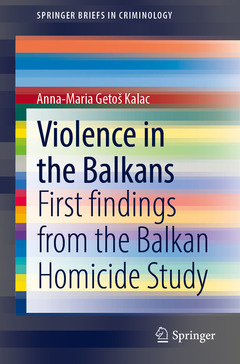This is the first volume to offer an in-depth look at (lethal) violence in the Balkans. The Balkans Homicide Study analyses 3,000 (attempted) homicide cases from Croatia, Hungary, Kosovo, Macedonia, Romania and Slovenia. Shedding light on a region long neglected in terms of empirical violence research, the study at hand asks:
- What types of homicides occur in the Balkans?
- Who are the perpetrators and what motivates them?
- Who are the victims and what potential protective factors are on their side?
- Why do prosecutors dismiss homicide investigations?
Amongst other questions and considerations, this brief discusses regional commonalities throughout the Balkans in view of their cultural,historical and normative context. Dismantling negative stereotypes of a growing and thriving Balkan society, this volume will be of interest to researchers in the Balkans, researchers of post-conflict regions, and those interested in the nature of homicide and its motivation, prevention, and various criminal justice approaches.




